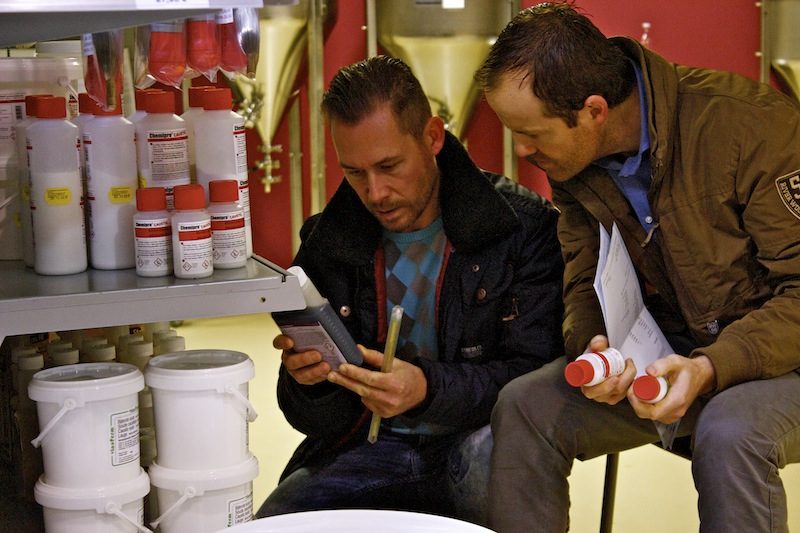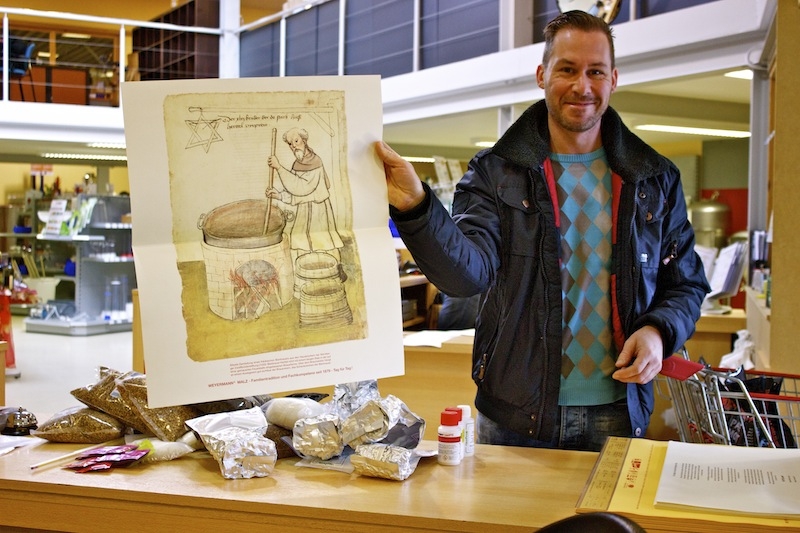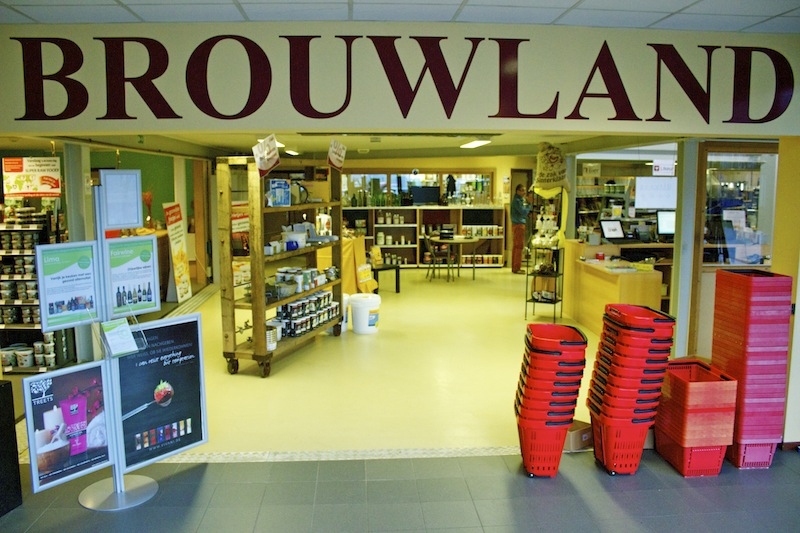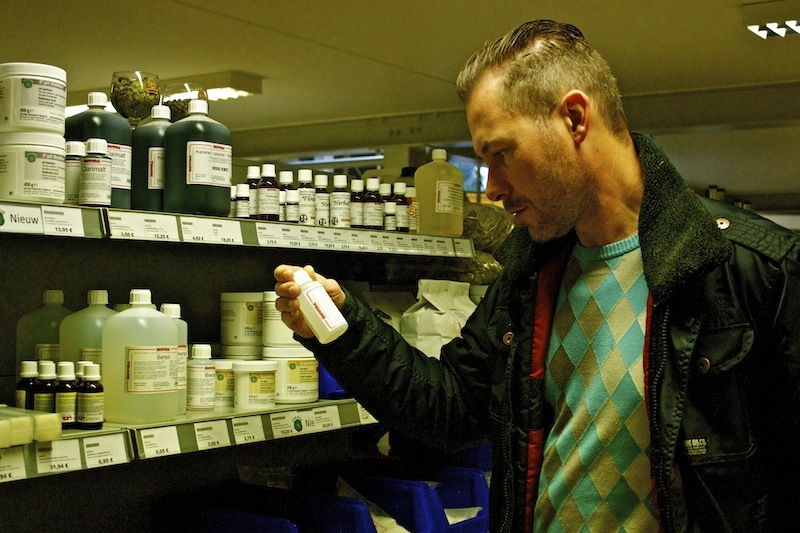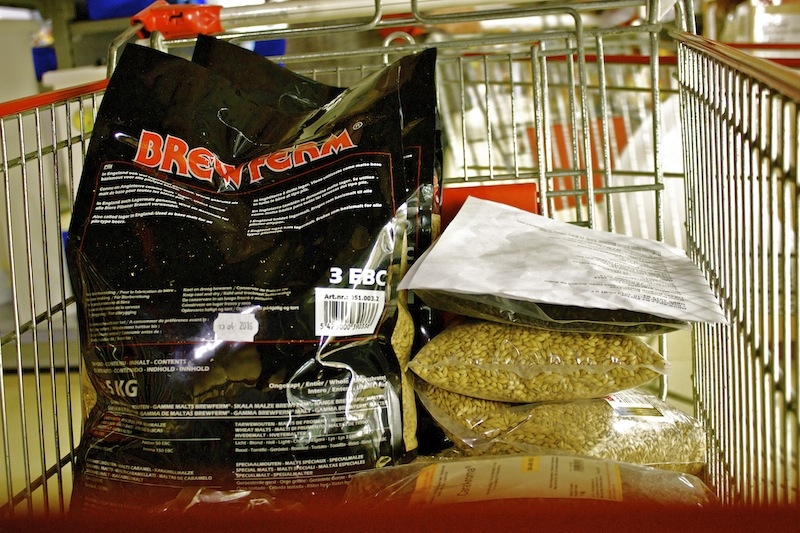There’s a German picture from 1425 which is considered among scholars and beer historians to be the oldest depiction of brewing.
It shows Herttel Pyrprew, a Franconian monk, stirring the kettle over an open fire, two wooden vats sitting to his right, and the famous Six-Point Brewer’s Star hanging above his head.
We see some copies of this picture on our visit to Brouwland, where we’re shopping for the Road to Porty ingredients and Franklin quickly grabs a copy for each of us. It will look good on the wall of our brewing space.
BROUWLAND | THE BEGINNING
This print of Herttel Pyrprew is the first recorded image of brewing. It’s an apt marker for the beginning of this project.
We’re here to shop for the ingredients of our Belgian Porter. Brouwland is a supermarket for anyone who wants to make beer, and it’s Europe’s most specialised supplier for brewers (they even supply to winemakers, distillers and cheesemakers).
The store we visit in Beverlo – a 1 hour 45 minutes drive from Ghent – is their main store in Belgium and welcomes visitors who home brew, but also those who brew commercially in microbreweries.
While the store itself is smaller than its international reputation might suggest, it’s supply of ingredients and equipment is nonetheless comprehensive.
THE SIX-POINT BREWER’S STAR
The Brewer’s Star that can be seen suspended over Herttel Pyrprew in our newly acquired print is a six-pointed star composed of two interwoven triangles. It was used in the Middle Ages as the traditional emblem of the brewer’s craft all across Europe.
A brewer’s star would also be displayed by Franconian homebrewers above their doorways whenever they had fresh beer available.
Herttel Pyrprew shows us the way for the #RoadToPorty mash. pic.twitter.com/tTKXU0x1oo
— Belgian Smaak (@belgiansmaak) January 2, 2015
On the back of the poster, there is a short explanation of what the star represents:
The emblem itself symbolises the perfect marriage of the four basic elements of air, water, fire and soil, which the brewer, like an alchemist, needed to master in order to transform them into something new…. beer.
Weyermann, Speciality Malting Company, Bambery, Germany.
Today is all about the ‘soil’ element.
WHAT THE HELL GOES INTO ROAD TO PORTY?
There are reams of information about what goes into beer and why. For the purposes of this project, here’s a short (and very basic) summary:
WATER: Beer is about 90% water so its importance in the brewing process cannot be overestimated. The water in London and Dublin is high in bicarbonates – i.e. hard, alkaline water suitable for dark beers like porters and stouts (as opposed to the soft water of Plzen and its lagers). We will be looking into the water quality in Balegem to understand the impact that this might have on the finished beer and where possible make adjustments for the Road to Porty.
MALT: Malts are germinated grains which have been dried to develop the enzymes required to modify their starches into the sugars we need for fermentation. We’ll be using various barley malts for those sugars as well as to get the desired colour in our beer and to give the beer with its flavour.
HOPS: Hops are the seed cones of a plant which will provide a distinct aroma and bitter flavour, balancing malt sweetness and acting as a natural preservative. Depending on the stage at which we add them, our hops can be referred to as bittering, flavouring, finishing or dry hopping.
YEAST: Yeast is a single-cell microorganism which will change our sugars into alcohol (giving our beer its alcohol content) and carbon dioxide (giving our beer its bubbles). There are hundreds of strains and our choice of yeast will have a huge impact on the flavour of our beer at the finish.
You can keep up to date with the Road to Porty project by signing up for our free updates (no spam)!
You can, of course, put in any other ingredients you’d like, and we intend to add something Irish and Scottish to symbolise Mike and Fiona’s union.
LOOKING AT THE WALL
We were shopping with our test brew in mind.
We will now be able to make three smaller and slightly varied batches to help us decide on a final recipe for Road to Porty.


